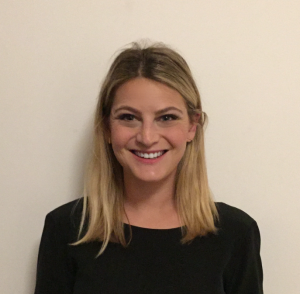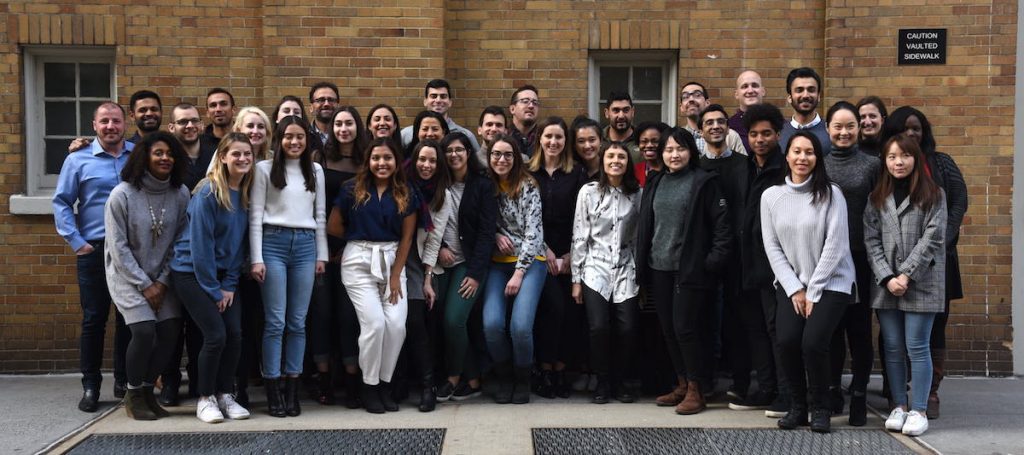This past January, we held our first Startup Sprint: a rapid, two-week program during J-Term where student entrepreneurs could dedicate time and focus on really getting to know their customer base, and validate (or invalidate) their startup hypotheses.
In total, the 13 participating teams (drawn from 11 schools/colleges across NYU) conducted over 650 customer interviews, an average of about 50 per team! To learn more about the program, check out this blog post on the teams selected, and this one on a general summary of the program.
For a deeper dive, we talked to a few of the participants to learn more about what the Startup Sprint really meant for them, and what the day-to-day was like. We asked Yuli Cai (Tisch ‘18) from Techa, Emily Graham (Wagner ‘18) from motivote, and Arash Asady (Stern ‘18) from EMCEE to share their experiences.
NYU Entrepreneurial Institute: What was your biggest motivator to show up at 8:30am every morning for the Startup Sprint?
Yuli: The awesome cohort environment. Everybody was so motivated everyday, I think that drove me the most. The expectation of having rich content in the morning with people who share the same goal woke me up in the morning.
Emily: The free breakfast! No, just kidding. The structure of the sprint, with afternoons reserved for “getting out of the building” and conducting customer interviews, meant that the mornings we had at the Leslie eLab were precious. Each session started promptly and was jam-packed with information so if you got there even a little bit late, you missed a ton. We wanted to learn as much as possible, so it was a no-brainer for us.
Arash: My biggest motivator was my startup and leading my teammates. We also wanted to make sure we participated in the entirety of the program to ensure we benefited our startup as much as possible.
Institute: How did your relationship with your teammates and other teams evolve over the course of the Startup Sprint?
Yuli: Even though I had been friends with my teammate for more than 2 years, we got to know each other way more than before because this was the first time we worked together for twelve hours straight, every single day. We made lots of friends from the other teams as well! We now bump into them often and always have a good time catching up.
Emily: Within our own team, we were basically inseparable for two weeks, so we had a lot of time to coalesce around our vision for our company, set goals and talk seriously about the future. It afforded us the brain space to focus exclusively on motivote (our startup) for two weeks. We also grew close with the other teams that participated in the Startup Sprint—it’s been such a treat to see them at other NYU entrepreneurship events and cheer them on!
Arash: We learned how to work together more cohesively and efficiently. The program was demanding in terms of everyday deliverables and activities, and my teammates and I learned how to delegate, communicate, and execute as a team on a daily basis. We also developed close relationships with the other teams and collaborated on projects and problem solving exercises.
Institute: What was the most challenging part about participating in the Startup Sprint, and why?
Yuli: I would say without hesitation that customer discovery was the most challenging part, from drafting an appropriate email and determining the appropriate recipients, to forming good questions and converting the answers to executable tasks for next steps. We had to convert unclear hypothetical ideas to clear next steps to move forward. That said, I think the word “challenge” comes with excitement and reward because when we actually did it, it really felt good.
Emily: It’s easy when working on a start-up to form a bit of an echo-chamber with your teammates: You have to be 100% committed to and passionate about your project, which means you can sometimes just reinforce your own beliefs and assumptions. The Startup Sprint exposed us to really valuable, but at times challenging, critiques and forced us to rethink a lot of aspects of our model that we had taken for granted. For the coaching and scrutiny from other teams alone, I’d recommend a Startup Sprint to everyone.
Arash: The most challenging part of the program was synthesizing and communicating our customer discovery research. It was a great exercise to get out of the building everyday and find and interview our consumer segment. The challenge, however, was digesting at least fifty different opinions while looking for patterns and communicating those patterns everyday.
Institute: Over the course of the Startup Sprint, where did you see the biggest shifts, both in yourself as an entrepreneur and in your startup? What do you think brought about those changes?
Yuli: This was my first startup experience. I had been thinking about doing one before but this is the first time putting it into something real. So personally, it cleared lots of uncertainty and confusion I had before. For Techa (our startup), we shifted our idea a little bit after participating the Startup Sprint and conducting customer interviews. We had this big, technical, heavy idea to build lots of complex tools at first, but gradually, by talking to our target audience, we found out that was not a necessary solution.
Emily: As Masters of Public Administration students, our team was laser-focused on driving policy and societal change that’s rooted in rigorous data analysis. We approached the problem of low voter turnout, at first, as social scientists seeking to solve a societal ill.
However, our interviews with over 60 potential customers revealed that it was not a disenchantment with politics or a lack of political efficacy, but instead a series of micro-barriers that we needed to overcome to help people get to the polls. Countless small, seemingly inane roadblocks like they forget to register to vote in time, or forgot to apply for an absentee ballot.
Or maybe they didn’t know about local elections and didn’t realize they could vote until it was too late.
This shift in our thinking was born out of Startup Sprint’s focus on product-market fit and intense, non-stop customer discovery. It really shifted the way we think about solving this problem.
Arash: The Startup Sprint really pushed us to take a deeper dive into our customer discovery research. Prior to the program we already conducted a few interviews and tested a few assumptions. However, during the Sprint we were able to conduct experiments and invalidate many of our previous assumptions, which helped us tremendously. The biggest shift in our thinking was realizing that we would not be able to deliver our primary value proposition to our mainstream market without building a small community of early users first. During the program we were able to identify our early adopters, which then led to a plan to acquire them (as customers).
Institute: For those who are jumping into their first Startup Sprint soon (the summer one’s coming up), what advice do you have?
Yuli: Have a good team to go through this with you, because the shared experience you would have with your teammates will set an important foundation and vision between you.
Emily: Do a lot of preparation ahead of time—schedule interviews, consider your goals for the sprint, do the readings, and be flexible. Your customer discovery goals will most likely change over the course of the sprint, so you need to be able to refocus and shift your mindset quickly in order to get the most out of the experience.
Arash: Be coachable and open minded, even if you think you have all the answers. Make sure your teammates are just as willing and committed as you are during the entire period and do not fall behind!
Institute: In a few words, how would you sum up the 10 days of the Startup Sprint?
Yuli: Painfully enjoyable and extremely helpful. Came in with a broad idea flying in the air, left with grounded next steps.
Emily: Challenging. Thought-provoking. Exhausting. Invaluable. Boundary-pushing.
Arash: Didactic. Growing pains. A springboard sprint.
Our next Startup Sprint will take place summer 2018 as a part of our summer accelerator offerings. Applicants must attend an info session or co-founder hunt before applying, and applications are due on 4/6 at 5pm. Learn more and RSVP here.
We are proud to highlight these NYU entrepreneurs as a part of our partnership with Blackstone LaunchPad and the #WeAreEntrepreneurs campaign.











